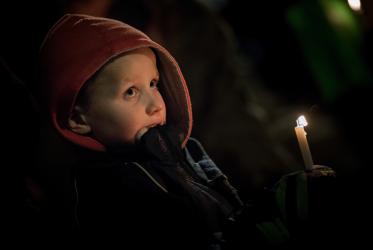The 2016 Central Committee meeting of the World Council of Churches (WCC) was called to order by its moderator, Dr Agnes Abuom, from the Anglican Church of Kenya, on the morning of 22 June in the city of Trondheim, Norway.
The Central Committee, a governing body which meets once every two years, is made up of 150 representatives elected from the 345 WCC member churches. The election of the current committee took place at the 10th Assembly (2013) of the WCC in Busan, Republic of Korea.
Plenary sessions on the opening day featured a moderator's report by Abuom and a second report by the WCC general secretary, Rev. Dr Olav Fykse Tveit. The meeting also heard a report from the WCC Executive Committee on developments in the council's programme and budget since the last gathering of the Central Committee in 2014.
Pilgrimage in partnership
Abuom recalled Trondheim's historic role as a pilgrimage site, and spoke of the many different landscapes through which pilgrims journey. The Norwegian city is home to Nidaros Cathedral, the world's northernmost medieval cathedral. She connected the spiritual tradition of pilgrimage to such a goal with the WCC's contemporary emphasis on a “pilgrimage of justice and peace.”
Calling on member churches to be catalysts for change in “a rapidly changing and increasingly pluralistic world,” she observed that “the pilgrimage offers us immense possibilities to re-imagine ourselves as a movement of God`s people in the mission – open and inclusive, and agile and receptive to the promptings of the Spirit.”
The moderator described the Christian's goal of justice as “a biased justice – biased towards the victims, the sinned against – the disempowered and the marginalized, the discriminated and the despised, the abused and the violated, the imprisoned and tortured, the displaced and the impoverished. It holds that as long as some are treated unjustly and denied life, justice is never real and complete.”
Abuom reminded the Central Committee, “We have affirmed time and again that the church is a people's movement and that the Pilgrimage of Justice and Peace will also engage people of other faiths and men and women of good will. Let us reclaim and rebuild our capacity for discourse.”
A fellowship of hope
In the general secretary`s report, Tveit described the church on pilgrimage as “a people defined by hope.” He explained, “This is not about generalized optimism, but instead about conveying a reason and motivation for hope. Often it means being able to see beyond what we see and expecting something more and something else, looking for justice and peace, and nothing less. Hope is a criterion of our Christian faith.”
Drawing on examples mentioned in the Executive Committee's review of activities since 2014, the general secretary spoke of WCC involvement in such stages of the pilgrimage as the Korean peninsula, Ukraine, Lebanon, Israel and Palestine, South Sudan, Burundi, Colombia, Nigeria and in cities of the United States that have experienced racial confrontation.
“We have established a network of peace initiatives,” Tveit reported. “Last week we gathered church participants from several of these countries for a workshop in Johannesburg, South Africa, commemorating 40 years since the Soweto massacre. The churches share with one another, from different parts of the world, how we are fulfilling our role of being peacemakers and calling for justice.”
Tveit forecast several important topics to be addressed by the Central Committee, including the relationship between religion and violence, and widespread expressions of discrimination, xenophobia and racism.
Ordained a minister by the Church of Norway, Tveit encouraged visitors to his native land to be “inspired by the geography around us, as well as the vivid expressions of pilgrimage for men and women of today coming to this city of Trondheim, literally walking in these landscapes.”
The week ahead
Later in the day, participants in the gathering were to join in a procession to Nidaros Cathedral to join Crown Prince Haakon Magnus of Norway in the Central Committee's service of opening prayer. On the eve of a Royal Anniversary marking 25 years since the consecration in Nidaros Cathedral of King Harald V and Queen Sonja, members of the churches in Norway, royalty from around the world and leaders of government were converging on Trondheim for the celebration.
The theme for the WCC Central Committee meeting in Trondheim is “Pilgrimage: Discerning the Landscapes Together.” There are to be plenary presentations and discussions on Christian unity through solidarity with the world's churches, the pilgrimage of justice and peace, religion and violence, the Middle East, as well as churches and the rights of children.
The 2016 meeting of the WCC Central Committee is to continue through Tuesday 28 June.
Also read:
Text of general secretary's report




![Image[1].jpeg](/sites/default/files/styles/teaser/public/photoshelterCopy/Image%5B1%5D.jpeg?h=44590859&itok=LMAXVRC6)

